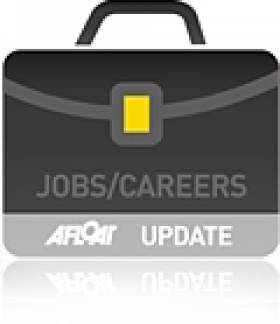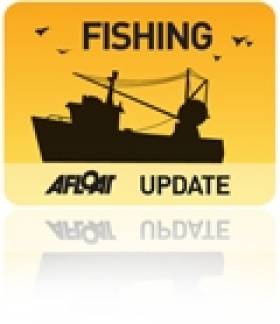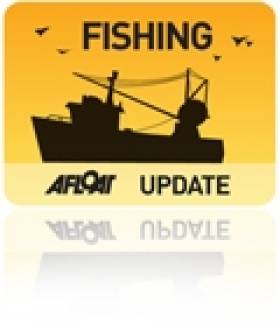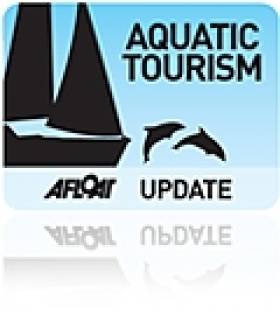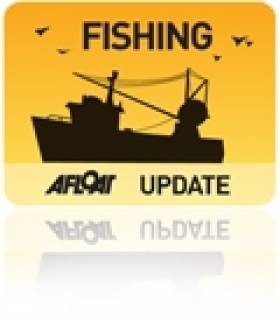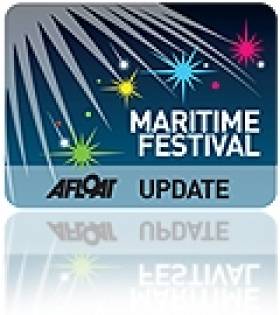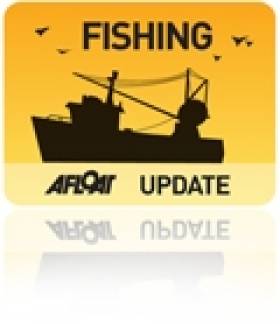Displaying items by tag: Seafood
Gold for Galway Bay Seafood in Great Taste Awards
#SEAFOOD BUSINESS - Galway Bay Seafood's ready-to-eat seafood range has received a boost with a number of its products getting gold stars in the UK's Great Taste awards.
The Galway Independent reports that the Galway-based fishmongers' barbecued salmon, barbecued and peppered smoked mackerel were awarded one gold star each, while smoked mackerel received the honour of two gold stars.
The locally produced fish will now carry the coveted Great Taste 2012 logo, described by proprietor Noel Holland as a "fantastic achievement" for the company and its staff.
"It is heartening to see all our work paying off and boosts the morale of everyone involved here," he told the Independent. "This boost will motivate us to keep striving to continually improve our business.”
Galway Bay Seafood's products were judged by a panel that included restaurateur and Masterchef winner Mat Follas - a chef whose seafood main helped him clinch that coveted title.
Seafood Sector Investment to Create 140 Jobs
#JOBS AND CAREERS - More than 140 jobs are expected to be created by 21 seafood processing companies nationwide thanks to a new €15.5 million investment deal.
As The Irish Times reports, Minister for the Marine Simon Coveney was set today to announce the investment, supported by grants of €3.2 million under European Union seafood processing business scheme.
Some 21 small and medium enterprises – based in coastal counties Dublin, Wexford, Cork, Kerry, Galway, Donegal and Louth – intend to create 142 jobs between them, and hope to see a €44 million increase in the sales of seafood products thanks to this investment.
Minister Coveney said the investment demonstrates confidence in the sector as an area of high growth potential.
For more on this story, Tom McSweeney examines the benefits of the deal for Ireland's marine sector in today's edition of This Island Nation.
Fishing Industry Welcomes Selective Nets, Grant Aid at Irish Skipper Expo
#FISHING - Minister for the Marine Simon Coveney briefed the Irish Skipper Expo in Galway last weekend on a new initiative promoting the use of selective conservation fishing nets, which allow young fish to escape.
Under the initiative in the Celtic Sea, additional quotas of up to 25% will be made available by the minister to skippers of Irish fishing boats which use an escape panel in their nets, allowing young whiting and haddock to escape.
The escape panel, developed by the Irish industry, has been endorsed at EU level and is expected to be a mandatory requirement later in the year.
Minister Coveney said on Saturday: “The use of this panel will significantly reduce discards of juvenile whiting and haddock in the Celtic Sea, allowing juvenile fish to grow and mature and contribute to increased stock size and returns for fishermen in future years.
"I believe that this offers an example of a practical approach to dealing effectively with the discards problem and retention of a flexible quota allocation system that we should take forward in the context of the Common Fisheries Policy Review."
In other news, Bord Iascaigh Mhara (BIM) announced €1.5 million in grant aid for the Irish fishing industry at the expo.
A spokesperson for BIM confirmed to the Galway Independent that the funding will be available to industry through a variety of schemes including fleet safety, seafood environmental management, lobster V-notching and coastal action groups.
Over 100 companies displayed their products and services to fishermen at the Irish Skipper Expo International 2012, held at the Galway Bay Hotel on 24-25 February.
- Fishing
- commercial fishing
- Minister for the Marine
- Simon Coveney
- Irish Skipper Expo
- Skipper Expo International
- 2012
- Galway Bay Hotel
- Galway
- conservation
- selective
- quota
- Celtic sea
- initiative
- discards
- grant aid
- Bord Iascaigh Mhara
- BIM
- Funding
- Coastal
- Seafood
- whiting
- haddock
- juvenile fish
- Common Fisheries Policy
Minister Launches Consultation on Harnessing Ireland's Ocean Wealth
#NEWS UPDATE - Minister for the Marine Simon Coveney has launched a public consultation process on harnessing the potential of Ireland's vast marine resources.
Our Ocean Wealth is calling for input into how Ireland can best capitalise on the trillion-euro global market for marine products and services, from seafood and tourism to shipping, oil and gas, renewable ocean energy and marine science.
Launching the consultation, Minister Coveney said: "We need to change the way we in Ireland think about the sea and look for new opportunities to harness the potential of our 220-million-acre marine resource.
"This government is determined to generate the momentum to drive forward a new era of sustainable economic development across the maritime sectors - we must avail of these opportunities to assist in our recovery. We want your help to shape our plan, to shape our future and to assist in our drive towards our nation's economic recovery."
The consultation process is a step towards developing an Integrated Marine Plan for Ireland intended to grow the percentage of GDP generated by the country's marine resource, which covers an area 10 times the size of Ireland's land mass.
The minister added: "We need an Integrated Marine Plan to harness our ocean wealth, get the environment right for investment and use the potential of our marine economy to create jobs in a sustainable manner."
The consultation phase will be open until 31 March with an aim to publish the Integrated Marine Plan during the summer. For more details visit www.ouroceanwealth.ie.
Cumbrians Urged to Try New Fish to Save Irish Sea Stocks
#FISHING - Seafood lovers of Cumbria in north-west England have been urged to broaden their tastes to save depleted stocks of their favourite fish in the Irish Sea.
According to the News & Star, some 80% of Britons "insist upon eating just five types of fish – cod, tuna, salmon, prawn and haddock."
But the Cumbria Wildlife Trust says that with coastal waters facing the serious threat of overfishing, a rethink is needed among both consumers and suppliers alike.
“The Irish Sea has a wide range of edible fish species but you wouldn’t know it judging by the fish counters in supermarkets across the county," says Lindsay Sullivan of the trust's Wild Oceans project, an 18-month scheme that hopes to "turn the tide for seafood".
A big part of this is encouraging consumers to skip the usual white fish and try different species such as flounder, monkfish and red mulllet, creating demand for cheaper and more sustainable fishing.
The News & Star has more on the story HERE.
Cork The Place to Be For a Holiday On The Sea
#TOURISM - Winter might be upon us, but it's a great time to plan a new year holiday in Ireland on the sea, according to the UK's Daily Echo.
From night-time paddling in with renowned kayaking instructor Jim Kennedy, to snorkelling in Baltimore, relaxing in Skibbereen and and fresh seafood lunches in Kinsale, a vacation in Cork can appeal to any taste.
Whale and dolphin watching is a big draw for the region, too, as Ireland's coast – the first cetacean sanctuary in Europe - plays host to a growing variety of species.
The summer feeding grounds off the southern coast are particularly busy, and tourist boats are often treated to whales breaching the surface and surrounded by dolphins putting on a show.
The Daily Echo has more on the story HERE.
National Seafood Centre Opens in Clonakilty
The UN estimates that the world will need an extra 42 million tonnes of seafood every year from 2030. The Minister said "my Department, the public servants working in this new facility and I are committed to making sure that every effort is made to position Ireland to take full advantage of the enormous opportunities we see for expanding the Seafood Sector in Ireland". The Minister added that he "is focussed on firstly moving away from selling 85% of our seafood production in commodity form and instead developing new high value processed seafood products in Ireland. Secondly, I want to attract a higher percentage of the near one million tonnes of seafood caught around Ireland to be landed into Ireland and serviced from Ireland. Thirdly, I am focussed on significantly expanding and developing sustainable Aquaculture in Ireland. I want this expansion to be in traditional fin fish and shellfish farming but also I am taking new initiatives to drive on new large scale deep water aquaculture which I see as a game changer in terms of Jobs and economic activity for our aquaculture industry and coastal communities".
This National Seafood Centre is being opened at a time of great challenge for Ireland but great opportunity for the seafood sector as a whole. Minister Coveney stated that "the Seafood Sector is very important to Ireland and holds a key to economic recovery and employment in many coastal areas and coastal communities from Greencastle in Donegal right around to Carlingford in Louth. Contrary to some people's perceptions, this is an industry for the future and in my view we have only begun to tap into the potential of the Seafood Sector in Ireland. Irish Seafood exports increased in value, in 2010 relative to 2009, by 14 % to €378m. In the first seven months of this year they are up by a further 10% relative to the first seven months of 2010".
This National Seafood Centre is a bespoke design by the Office of Public Works (OPW) to meet the specific needs of these organisations and the functions and services being delivered from the building. The idea of co-locating all of the State seafood industry related services in one building is designed to improve co-ordination, and maximise the sharing of expertise in order to enhance development of the Seafood Industry in Ireland. The Centre incorporates the State's first dedicated facility for the development of new high value seafood products and presentations and this facility has had 330 large medium and small Seafood Processing companies through its doors since opening and has been associated with the development of new seafood products accounting for sales of €10m to date and growing. At present there are 140 people directly employed in the Centre many of whom have relocated from Dublin and other parts of Ireland to the area thus adding to the economic viability of the Clonakilty area.
The Minister added "the new National Seafood Centre is testament to the Government's commitment to developing the Seafood Industry in Ireland and the work done at this Centre will be central to realising the potential of our Seafood sector". Minister Coveney concluded by congratulating all involved in bringing this Centre into being before unveiling the naming stone for the new National Seafood Centre and officially opening the building.
Scottish Oyster Shucker to Compete in Galway World Championships
Son of oyster farmers Hugo and Judith Vajk of Caledonian Oysters, Angus won the Loch Fyne Scottish Oyster Opening Championships in Glasgow last month, beating a dozen other competitors including his father!
"I have been opening oysters since before I could walk," he quipped, as he accepted a prize plate from Virginia Sumsion, Marketing and Events Director of Loch Fyne Oysters. "I am thrilled to have won, and excited about going to the world championships, but it will be daunting being up against so many experts. I will be putting in a lot of speed practice this week!"
Part of his prize was a trip to Galway to enjoy the annual international oyster and seafood festival, but Angus had to wait for the organisers of the world competition to confirm that his opening time of 4 minutes 5 seconds for 30 oysters was good enough to allow him to compete there.
"Angus was a worthy winner and we are delighted to sponsor his entry in the worlds. We hope he will do well and bring the cup back home!" said Virginia Sumsion.
Seafood Scotland, which helped to organise the Scottish competition at the Glasgow Riverside Festival, also wishes Angus the very best of luck. "This is the first time ever that the world oyster opening championship has had a Scottish competitor, so it is an honour for Angus to fly the flag for his country," said Marketing Manger Clare Dixon.
Fine Gael Pledges to 'Steer the Marine' in Election Manifesto
Fine Gael has pledged to reinstate the Department of the Marine in its election manifesto published today. Under the heading 'steering the marine' Fine Gael also says it will replace the Boards of all State Port companies and Harbour Commissions within one year of entering government. The full chapter dealing with Marine is below:
1.11 Supporting the Seafood Sector and Marine
Expanding the Industry: Fine Gael believes Ireland, as an island nation with a strong and valued fishing tradition has huge potential to succeed as a serious competitor in the international seafood sector. The seafood industry currently generates annual revenues of €718 million and provides direct employment for 11,000 people. With an estimated 40 million tonnes of seafood to be required annually by 2030, there is significant scope for further expansion.
Common Fisheries Policy:
We will negotiate the best possible deal for Irish fishermen in the context of the ongoing review of the Common Fisheries Policy. Our priorities are:
• A progressive reduction of discards, fishery by fishery and in all maritime regions in the EU.
• Protection of the Hague Preferences.
• A uniform and transparent regulation regime.
• A clear, independently audited database of infringements across the EU.
• The development of a sustainable aquaculture plan.
• A strong focus on seafood marketing, labelling and country of origin to ensure imports meet the same
standards on safety, hygiene, traceability, recall, information and audit.
Sea Fisheries Bill:
We will publish legislation to replace the criminal sanctions system for minor fisheries offences with an administrative sanction system to bring Ireland into line with other European jurisdictions.
Funding for Fisheries:
Fianna Fáil and Green Party in-fighting has limited Ireland's ability to draw down EU funds for seafood development. We will resolve difficulties blocking the drawdown of available funds. Aquaculture Licensing: An additional 42 million tonnes of farmed seafood will be required to keep pace with demand each year by 2030, just 20 years away. We must increase our raw material supply and expand our aquaculture sector. We will remove administrative obstacles and clear the backlog of aquaculture licences currently preventing the creation of thousands of jobs in the aquaculture sector.
Value Added Products:
Currently, 85% of all Irish seafood is commodity traded. There is a significant opportunity to generate more value from this raw material base. Fine Gael will task Bord Iascaigh Mhara with assisting Irish companies in adding value to their products through innovation.
Single Food Label:
We will create and market a single label for all Irish produce and will drive a targeted marketing campaign to grow the Irish brand in new markets.
1.12 Steering the Marine
Marine Department:
Marine and fisheries policy is currently spread across three Departments. Fine Gael will merge these responsibilities under one Department for better co-ordination in policy delivery.
National Marine and Coastal Plan:
We will develop an integrated marine and coastal planning process to reach the full potential of our coastline in fishing, aquaculture, ocean energy and tourism.
Ports Development:
We will support the development of our ports and marine sector as important drivers of economic growth. We will also replace the Boards of all State Port companies and Harbour Commissions within one year of entering government.
The manifesto is HERE
Grant Aid Announced for 129 Fisheries Projects
Grant-aid of €1,122,084 is being provided to support a total investment of €2,023,127 for safety upgrades on board fishing vessels, lobster conservation, the development of Environmental Management Systems for Ireland's fishing fleet, and a number of collectively based projects under the new Marine Environment Protection Scheme (MEPS).
"These projects will further support our fishing industry", said Minister Connick. "Based as they are on the principle of responsible fishing practices that result in premium quality Irish seafood, the environmental focus for many of these projects will be critical in sustaining Ireland's fisheries sector during this time of unprecedented economic challenge".
A range of marine environment, conservation and safety initiatives are approved. Jointly developed by the industry and Bord Iascaigh Mhara, the Seafood Environmental Management System (sEMS) and the Marine Environment Protection Scheme (MEPS), respond to the growing demand by seafood providers and consumers for access to responsibly sourced wild caught fish. Included is grant-aid of over €350,000 to assist Irish fishing vessels develop and implement Environmental Management Systems as well as undergoing third-party accreditation for the newly developed BIM Stewardship Standard. This internationally accredited (ISO65 – EN45011) standard is amongst the first of its kind worldwide. Ireland led the way with the introduction of the first such scheme for salmon in 2005 and since then has developed similar schemes for mussels and oysters.
BIM will also roll out the €419,000 Marine Environment Protection Measure, a programme aimed to maintain healthy fish stocks while simultaneously developing the marine environment. The national lobster conservation programme is also funded to the tune of €113,000 with a similar investment being made by inshore fishermen.
A full list of all the projects funded is provided below.
Sea Fisheries Development Programme
Fisheries Operational Programme – European Fisheries Fund
|
SCHEME |
Projects Approved |
Investment |
Total Grant Aid |
|
Marine Environment Protection Measure*
|
8 |
€477,366 |
€418,902 |
|
SEAFOOD ENVIRONMENTAL MANAGEMENT & CERTIFICATION GRANT AID SCHEME*
|
7 |
€740,117 |
€350,073 |
|
Shellfish Discard & Live Return Reduction scheme - Lobster conservation* |
42 |
€205,680 |
€113,124 |
|
FLEET SAFETY SCHEME
|
70 |
€483,936 |
€193,574 |
|
MARINE TOURISM SAFETY SCHEME
|
2 |
€116,029 |
€46,411 |
|
TOTAL |
129 |
€2,023,127 |
€1,122,084 |



























